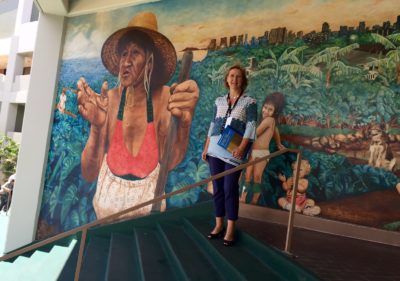Siri Granum Carson on triple structure of social legitimacy in Hawaii Conference.
In the middle of the Pacific Ocean lies Hawaii, the 50th US state, consisting only of islands. The state faces considerable and accelerating threats from climate change – among the effects already seen in this vulnerable region are less fresh water, more coastal erosion and degraded coral reefs. How do organizations and communities adapt and prepare for changes in a time of ecological and social vulnerability?
This was the topic of the 16th International Conference on Knowledge, Culture, and Change in Organizations at the University of Hawaii at Manoa, Honolulu on 19-20 April 2016. The plenary sessions focused on responsible risk management in the face of climate and extreme weather-related impacts, and this topic was followed up in a number of parallel sessions as well as in so-called garden conversations. Forfood researcher Siri Granum Carson took part in the conference, presenting her paper “Explicit CSR and the ‘triple triple structure’ of social legitimacy” for the conference’s special track “Climates of Change: Organizations in a Time of Ecological and Social Vulnerability”.
In her presentation, she argued that organizations’ increasing expressiveness on social and environmental issues is a response to an increasing complexity of expectations. Business organizations are expected to take their share of responsibility for the social and ecological challenges society faces, and CSR (corporate social responsibility) programs are launched in the attempt to maintain or regain the social legitimacy of these organizations. Carson focused on food production in her presentation, using Norwegian salmon farming as an example of an industry struggling to deal with an increasingly complex set of local, national and global expectations.



